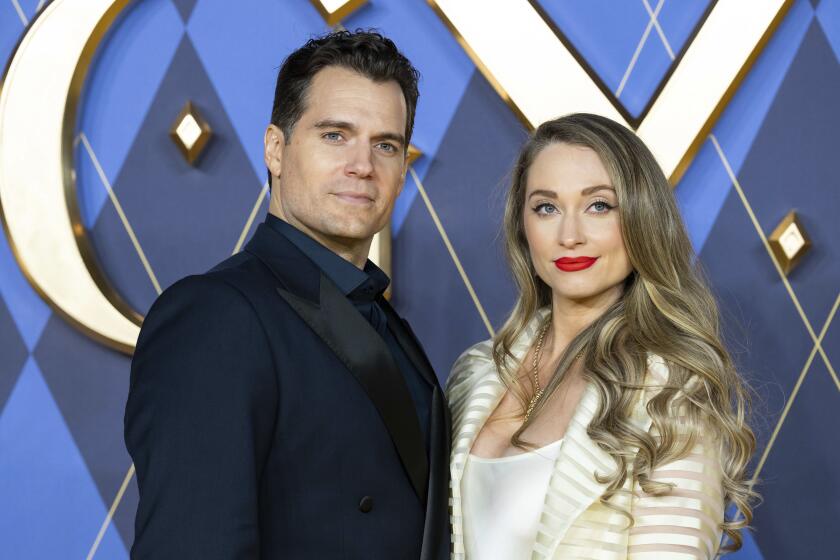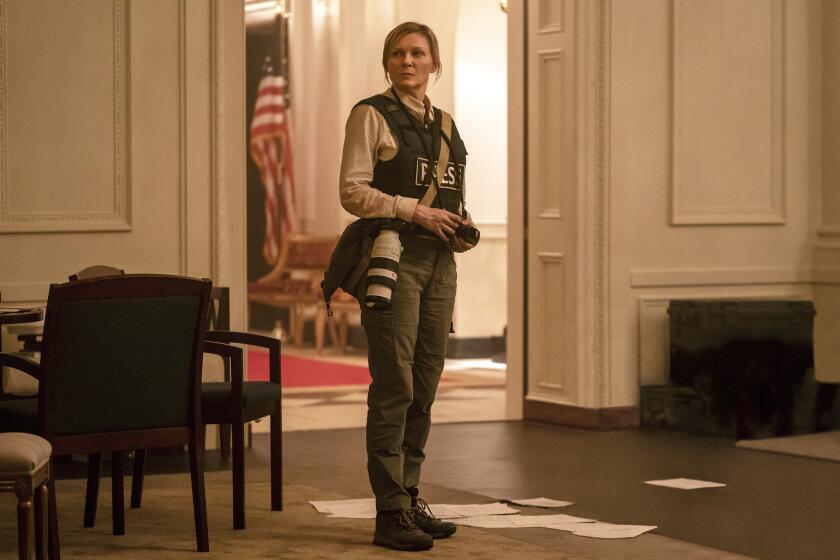Faces of Islam
They are, to be sure, ideas that go unexplored in the Koran: Is it a sin to slam dance? Can a person wear his hair in a mohawk, smoke weed like Snoop Dogg and still call himself a devout Muslim under the eyes of God? The micro-budgeted feature “The Taqwacores” — which premiered at the Sundance Film Festival in January, opened in New York last week and reaches theaters in Los Angeles on Friday — tackles such issues head-on.
FOR THE RECORD:
“Taqwacores” review: The Nov. 11 Calendar section review of the film “The Taqwacores” said a character in the film, Yusef, was an Arab American. The character is a Pakistani American. —
An adaptation of Michael Muhammad Knight’s self-published 2003 novel and directed by novice filmmaker Eyad Zahra, “The Taqwacores” encapsulates a shotgun marriage of two seemingly incompatible worldviews: “taqwa,” an Arabic word that can be defined as “piety” (but also “God fearing”), and the anarcho-rebellion of hard-core punk.
“If you strip down what punk is really all about, it’s questioning the standards of the status quo and society and really looking for the ultimate truth,” said Zahra, 27. “And that’s the same thing that religion does.”
The movie follows a nerdy Arab American college student named Yusef (played by Bobby Naderi) who moves into a dilapidated Buffalo, N.Y., apartment populated by an array of broad punk archetypes who also are devout Muslims — “the boys who missed the Islamic center picnic and the girls who date behind their father’s backs,” as a character named Jehangir (Dominic Rains) puts it. Each of them navigates the middle ground between the mosque and the mosh pit in a different way.
There’s a burka-clad Riot Grrrl who scribbles Patti Smith lyrics on her wall and puts forward the notion that a woman doesn’t necessarily need to make her face visible to qualify as an outspoken feminist. Another electric guitar-playing skateboarder character tests the limits of his faith by chugging beer and declaring, “I’m not big on the ‘Islam is one way’ approach.”
The Taqwacores generally reject specific tenets of Koranic dogma: that homosexuality is a sin, that masturbation amounts to “self-harm” and that a man is justified in beating his wife to discipline her.
But outside of mashing-up of punk with Islam, “The Taqwacores” presents compelling ideas about how modern Muslims worship in this country. The film presents Islam as a dynamic faith that’s endlessly argued and debated — and in one case, straight-up revised when a character crosses out a verse in the Koran — to fit unruly American lives in the post- 9/11 world.
“The point of the film was to portray Muslims in this whole new way,” the director explained. “There’s a notion that Muslims are zombies; they only regurgitate what they’re told by the leaders of their community. But there’s a huge spectrum. We’re showing an extreme of it.”
Knight, who converted to Islam at age 16, says he wrote “The Taqwacores” as a “kiss-off” to being a Muslim in 2003. In appropriately punk DIY-fashion, Knight Xeroxed copies and self-distributed “The Taqwacores” more as an underground fanzine than a vanity publishing venture.
“The idea that Islam was either all or nothing started to fall apart for me,” recalled Knight, who is now enrolled at Harvard pursuing a graduate degree in Islamic studies. “Then in college, I encountered punk rock kids who taught me to believe in myself and not compromise who I am. So out of that, I wrote the novel as a fantasy, almost like science fiction. It’s an artificial world I wanted to exist.”
Knight ended up providing a rallying point to an emergent movement decidedly off the mainstream radar. In a case of life imitating art, a real-life Muslim punk scene claimed the name Taqwacore as its own. “I didn’t imagine there could be Muslim kids like that out there,” Knight said. “There were, they just didn’t know about each other. Giving it a name made it real.”
The film project began to take shape in 2007 when Zahra was working as an assistant to director Andrew Dominik (2007’s “The Assassination of Jesse James by the Coward Robert Ford”) and stumbled across Knight’s Wikipedia page. Reading a description of “The Taqwacores” as “a book about punk Muslims” stopped Zahra in his tracks. “It was like having the wind knocked out of me,” he recalled.
Despite having only a couple of short films to his credit, Zahra convinced Knight to sell him the movie option. After securing a tiny budget through independent financing, the director set about casting “Taqwacores” with the help of an established Hollywood casting director who delivered some bad news: “There aren’t enough minority actors to fill these roles.”
Ignoring that advice, Zahra ended up finding his actors through an online casting call. And in a cost-cutting move, he moved back home to Cleveland, crashed at his parents’ house and enlisted film school pals and local punk rock scene volunteers for the production’s three-week shoot.
To provide added realism — and avoid the kind of sub-cultural backlash that plagued “inauthentic” punk-themed movies like 1998’s “SLC Punk!” — the filmmaker enlisted Marwan Kamel of the “doom-crust punk band” Al-Thawra from Chicago to serve as production designer.
“I understood the characters in the book and the film as punk archetypes as well as Islamic archetypes,” Kamel said. “They’re both politicized identities. So I tried to make the characters almost cartoon-y versions of the real thing. I wanted them to be realistic but also over the top.”
Added Zahra: “This isn’t just characters with mohawks running around spray-painting things. Honesty was our guiding point.”
Musicians now identified with the Taqwacore music scene, such as Basim Usmani of the Philadelphia-based group the Kominas, say the movement has provided common ground for Muslim Americans who felt marginalized by both alternative music and American culture at large.
“Taqwacore was a refreshing and earnest attempt to make sense of things,” Usmani said, “an opportunity to be really unapologetic about being different and being able to work together. We felt like we finally had a platform to relate to each other.”
More to Read
Only good movies
Get the Indie Focus newsletter, Mark Olsen's weekly guide to the world of cinema.
You may occasionally receive promotional content from the Los Angeles Times.







